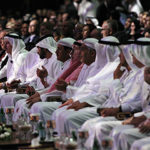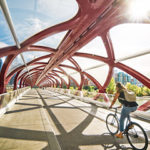 Dubai is known for having the world’s tallest building, the world’s biggest shopping mall, and, as of last year, when Dubai International Airport surpassed London Heathrow International, the world’s top airport for international travelers.
Dubai is known for having the world’s tallest building, the world’s biggest shopping mall, and, as of last year, when Dubai International Airport surpassed London Heathrow International, the world’s top airport for international travelers.
The city is also gaining steam as a meetings destination — in 2014, Dubai rose to 44th place in the International Congress and Convention Association’s (ICCA) global rankings of number of international association meetings hosted, up from 64th place in 2013.
Even so, many planners aren’t very knowledgeable about Dubai — either its location or what it has to offer as a meetings destination, according to Jeremy Luski, a global event consultant. Luski, who has organized meetings in the city and region, was one of 19 senior meeting professionals who traveled to Dubai from the United States and Europe to take part in PCMA’s 2015 Dubai Meetings Forum on Dec. 5–7. I was there, too, on behalf of Convene.
Held in partnership with Dubai Business Events, the Forum gave planners a chance to meet with local association leaders, meeting organizers, and suppliers to share knowledge about best practices for bringing international meetings to the city. It was also an opportunity for the planners — most of whom were visiting Dubai for the first time — to talk candidly about their perceptions with local officials and meeting professionals. Those who are from Dubai are used to putting potential visitors from the United States at ease. “The question will come up: Is it safe?” said economist strategist Afshin Molavi, who spoke at a half-day education panel on Dec. 7.
Speakers at Dubai’s Sheikh Mohammed Centre for Cultural Understanding are also accustomed to fielding questions about security. Director Nasif Kayed, who spoke to the group during an orientation session, summed up common misperceptions like this: “You think we are all oil-rich Arabs, terrorists, and that we all have four wives.”
In reality, Dubai is the fourth-most-visited city in the world and ranked as one of the top 20 safest. It’s a cosmopolitan city with a diversified economy made up of a population that is 90-percent expatriate and 10-percent Emirati. “I feel safer in Dubai than I do at home,” said panelist Mohamed Mezghani, deputy secretary general of UITP (International Association of Public Transport), who is based in Brussels.
“The Middle East is a geopolitical description,” Molavi said, “but could just as easily be called West Asia.” Commercially, Dubai is a gateway to the world’s emerging markets in Asia and Africa. “Today, three out of four people in the world live in Asia or Africa, a proportion that is increasing.”
Dubai is more than 7,000 miles away from the United States’ east coast, but for most of the world, the city is a global hub: One-third of the world’s population can fly to Dubai in four hours or less, and two-thirds can do so in eight hours or less.
Playground for the Wealthy?
Forum participants also discussed Dubai’s reputation as an over-the-top destination for the rich and famous, home to indoor ski slopes and hotels including the gold-plated Burj al Arab, and the price sensitivity of many associations.

Although Dubai is known for its five-star accommodations, the government is committed to adding more three- and four-star hotels, and is offering incentives to developers to build them, said Issam Kazim, CEO of the Dubai Corporation for Tourism and Commerce Marketing (DCTCM). Dubai currently has more than 90,000 hotel rooms, a number that is forecast to rise to between 140,000 and 160,000 rooms by 2020. Of those new rooms, 20,000 to 35,000 will be mid-market hotels.
“I think it’s all very positive,” said Gary Stroner, managing director of VISTA Medical Meeting & Events. It was Stroner’s first visit to Dubai, but his company previously has held events in the city. “I don’t see that security is an issue at all,” he said. “The infrastructure is fantastic. There is so much going on and so many new hotels — it’s mind-boggling that so much is happening so quickly. Dubai, this is your time.”



